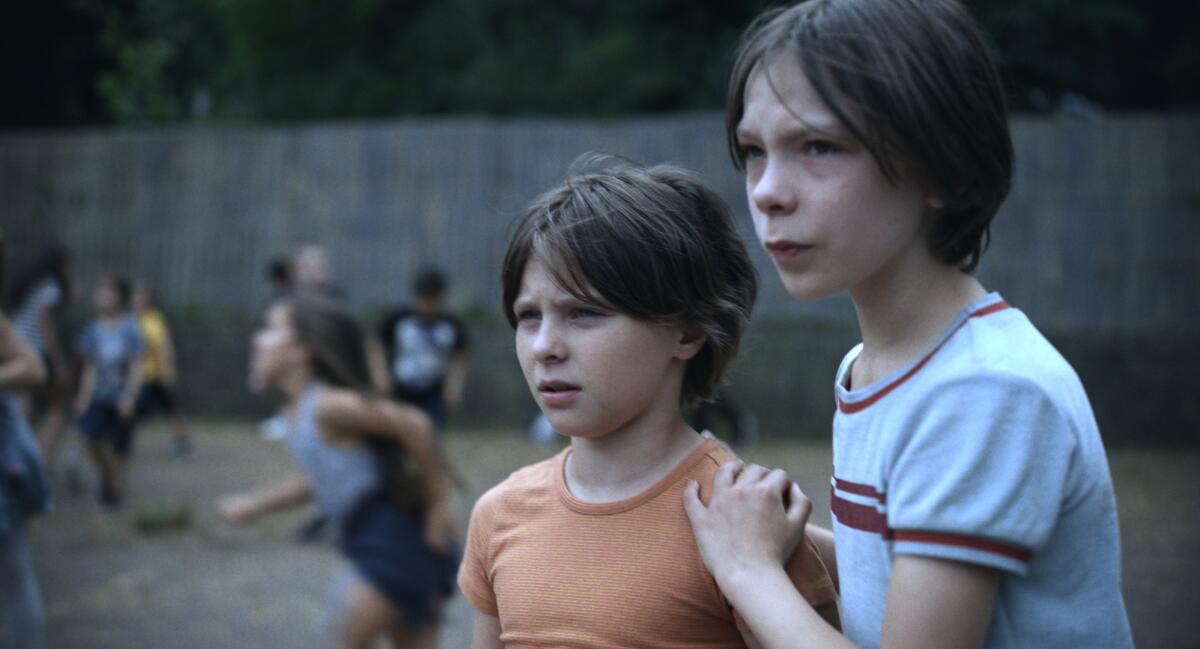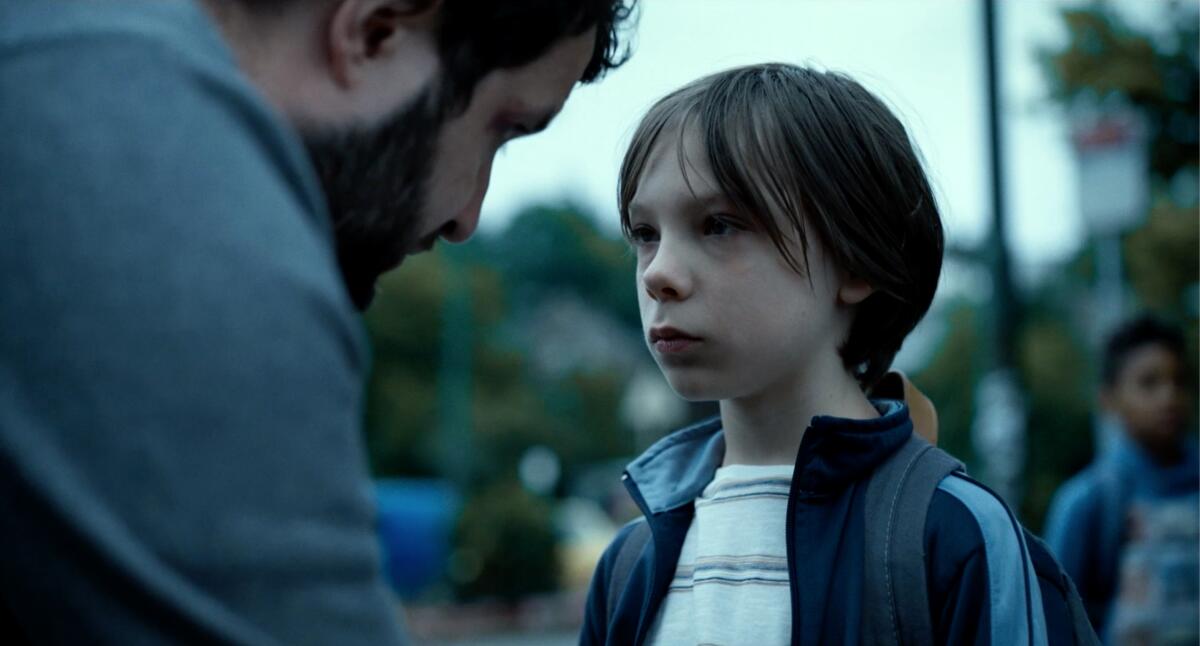‘Playground,’ Belgium’s Oscar entry, is a must-see drama about school bullying

- Share via
You don’t have to be parenting a grade-school kid for the Belgian drama “Playground” to shred your nerves or break your heart, though I can attest that it helps. (So does having been a grade-school kid yourself.) A sharply chiseled, wrenchingly observed first feature written and directed by Laura Wandel, the movie follows a 7-year-old named Nora (Maya Vanderbeque) as her primary education begins and she finds herself adrift in a cold, gray world of commonplace cruelty. You’ll recognize a lot of what she witnesses and endures: the cruel insults, the violent scuffles, the ineffectual parent-teacher interventions. Mostly you’ll recognize Nora, whose extraordinarily sad, watchful gaze expresses all the pain and confusion that she can’t yet put into words.
Wandel confronts you with that gaze in the movie’s grabber of an opening shot as Nora, her face streaked with tears, clings tightly to her older brother, Abel (Günter Duret). It’s her first day of school, and they’re saying goodbye not only to their father (Karim Leklou) but also to each other. Barely a few years apart in age, Nora and Abel seem particularly close — maybe closer than you’d expect, since society, like the movies, tends to reinforce lazy assumptions about sibling animus, especially between brothers and sisters. “Playground” doesn’t just suggest the opposite; it grasps that, while these ties can be a source of anger and shame, they can also be a crucial emotional lifeline. A moral one too.
For your safety
The Times is committed to reviewing theatrical film releases during the COVID-19 pandemic. Because moviegoing carries risks during this time, we remind readers to follow health and safety guidelines as outlined by the CDC and local health officials.
Over time, Nora and Abel will be gradually ripped apart, sometimes by banal institutional rules (kids from different grades aren’t allowed to sit together at lunch) but more often by the cruel Darwinian logic of the schoolyard. There’s a reason why Abel avoids Nora at recess, one that she discovers on Day One, when she crosses into the big kids’ zone and catches her brother picking on some kids with a taller, tougher classmate, Antoine (Simon Caudry). Abel has already learned one of life’s uglier lessons — bully or be bullied — and he warns Nora not to get involved, not just because she risks becoming a target but because she could turn him into one too. His fears turn out to be depressingly well founded.
Soon Abel is being bullied himself, though what we see of his sufferings is filtered entirely through Nora’s eyes. “Playground,” which unfolds over several weeks but never leaves the confines of the school, is an experience of sustained intensity and radical subjectivity. (And remarkable economy: The movie runs a taut 72 minutes.) As she adjusts to her new surroundings and makes a few friends in class, Nora remains front and center, not just narratively but visually. From start to finish, the camera remains at her eye level, adopting the low-to-the-ground perspective of a kid wandering beside her in the yard or sitting with her at lunch.
It’s a profoundly empathetic gesture from Wandel and her cinematographer, Frédéric Noirhomme, but also an intuitive one. Like her acclaimed countrymen Luc and Jean-Pierre Dardenne (“Rosetta,” “L’Enfant”), whose mode of spiritually infused neorealism is evoked but not mimicked here, Wandel can find an unbearable moral suspense in an image as nondescript as the back of a girl’s head. She reminds you just how rarely the movies try to approximate a child’s vantage — a vantage that “Playground” makes even more immersive with tight, shallow-focus close-ups (the buildings behind Nora become a blur) and the ever-present sounds of other kids laughing, yelling, taunting.

Those voices and others are sometimes deliberately disembodied. Wandel trains her camera so intently on Nora that we often don’t see who’s speaking to her, whether it’s a gym teacher giving her instructions or her classmates swapping the latest gossip at lunch. In time, that gossip will swirl around Abel, who endures so much humiliation and trauma at his tormentors’ hands that he becomes the school laughingstock — a crushing development that puts its own tremendous strain on Nora, whose association with Abel makes her vulnerable in turn to the rejection of her own friends. Vanderbeque gives what may be the most fully formed child performance in recent memory. Confronted by a camera that gives her no room to hide, her eyes register mercurial fluctuations of feeling, pivoting from intense fear to growing confidence, from paralyzing shock to bitter disillusionment, as Nora gradually realizes what she and her brother are up against.
The French title of “Playground” (“Un Monde”) literally means “a world,” which is fitting for a movie that creates a world defined entirely by the limits of its protagonist’s perceptions. Adult authority has little real presence or purpose in this world; the few adults here loom over Nora, their heads often cut off by the top of the frame, except on those brief occasions when they kneel down to speak with their young charges. It’s a sobering reminder of just how distant and ineffectual grown-ups can be, even the best-intentioned ones, like the kind teacher (Laura Verlinden) who lends a compassionate ear to Nora when she needs it most. I’ll confess that the figure of Nora and Abel’s loving father, trying in vain to fix their problems the only way he knows how, filled me with recognition to the point of indictment; the movie left me wondering about the playground dramas I’ve heard my own 5-year-old share, and also the many she doubtless hasn’t.
No one in this movie has a complete understanding of what’s going on, but Wandel proves that a sensitive enough camera can provide a fuller picture than most. She’s viscerally attuned to the violence of Antoine’s physical assaults, but she also catches the subtler verbal blows inflicted by Nora’s mocking friends. Faced with her own looming ostracism in a school that sometimes feels more like a prison, what is Nora to do? Will she spurn her brother, as everyone else has, in order to save face, or will she find a way to save him and perhaps herself? The final shot of “Playground” bravely answers that question, with a tenderness that refuses the easy comforts of either sentimentality or cheap cynicism. Nora and Abel, the movie insists, are not as alone as they think. Maybe none of us are.
‘Playground’
(In French with English subtitles)
No rating
Running time: 1 hour, 12 minutes
Playing: Starts Feb. 18 at Laemmle Royal, West Los Angeles; virtual screenings start March 11
More to Read
Only good movies
Get the Indie Focus newsletter, Mark Olsen's weekly guide to the world of cinema.
You may occasionally receive promotional content from the Los Angeles Times.











